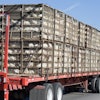
Ag-gag laws have been discussed in many U.S. states as a way to prevent animal rights activists from unethically recording undercover videos at animal agricultural operations. But not everybody thinks such laws should exist.
Both sides of the argument make sense.
Adopting and enforcing such laws will deter this type of activity and protect farmers. This is especially good in cases where no abuse or neglect is actually happening, but footage could be misrepresented as such.
But ag-gag laws also create skepticism because it encourages secrecy instead of transparency and trust. You could also argue that these types of laws would curb the use of some videos that have exposed legitimate breaches in animal welfare from some abusive people who never should have been working with live animals in the first place.
Regardless of which side you are on, two points should be universal:
- It is morally wrong to lie or deceive about wanting to get a job with a farm or company when you have an outside agenda.
- Trespassing is illegal, and therefore, not cool.
Addressing the trespassing issue
In Australia, and more specifically in the state of New South Wales, discussions have been taking place in an effort to address at least the trespassing issue without making undercover video filming itself illegal.
According to a report in the Guardian, a series of joint roundtable meetings have been taking place between the state and federal governments and those in livestock and poultry production to discuss the problem of members of animal rights groups trespassing to film videos of alleged or legitimate animal mistreatment.
Documents obtained by the Guardian show that Deputy Prime Minister Barnaby Joyce and New South Wales government officials have floated the idea of stripping the charitable status from animal rights groups whose members trespass. That could be a pretty stern punishment, as it would remove some pretty significant tax benefits.
But, if that were to be done, would that be taking things too far?
Probably not.
Doing wrong to expose another wrong is still wrong. Taking away a group’s charitable status would only send this message: If you want to keep doing undercover videos, feel free, but if you break the law in order to do so, there will be consequences for not only you, but also the group you represent.
Principle transcends animal rights
If Australian officials put this idea into practice, it could set a standard that wouldn’t just apply to animal rights groups. Fair is fair. If someone in a tax-exempt pro-farming organization were to trespass to expose what is viewed as improper behavior from adversaries, the same principle could be applied.
The possibilities of how this standard could be put to use are almost endless. But for now, it might make some animal rights activists think twice about how they go about getting their message across.


















